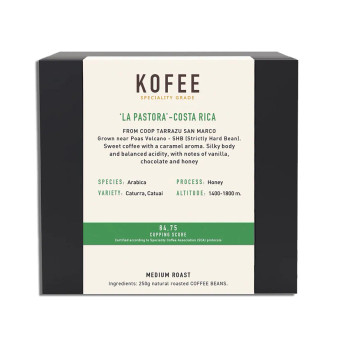Product Description
Exceptional coffee. Explore our range of seasonal microlot specialty coffees. At Kofee, we're dedicated to offering unique and exclusive coffee experiences. These seasonal microlots highlight the distinct flavors and craftsmanship of specific origins throughout the year
This microlot from Honduras has been fermented and macerated in sealed barrels for 72 hours, and then dried for three to four weeks on raised beds. It has wonderful notes of tropical fruits, caramelized apple, vanilla, dark chocolate.
ORIGIN: Honduras
REGION: Los Limos
PRODUCER: Sol Naciente - Donaldo Gonzalez Fiallos
ELEVATION: 1400 - 1500 m.
VARIETY: IHCAFE 90, Parainema
PROCESSING METHOD: Anaerobic natural, 72h fermentation, dried on raised beds
Donaldo Gonzalez Fiallos is the general manager and one of the founding members of the Aruco cooperative. He also owns and manages his own farm, Sol Naciente, in the Los Limos area of Corquin, Copan. The 7-hectare farm is located at an altitude of 1250masl and is primarily planted with Catuai, but he has also started planting other varieties like Lempira, Parainema, and IHCAFE90.
Until recently, most Honduran green coffee production was focused on exchange trade, and the country was primarily seen as an exporter of cheap beans. Despite the suitable growing conditions, fertile soils, sufficient altitude, and excellent microclimate, a lack of infrastructure for processing and quality control led to a poor reputation among demanding buyers. In 1998, the situation worsened: Hurricane Mitch destroyed 80% of the country's agriculture, so farmers preferred to smuggle their coffee to Guatemala at a higher price, despite the government's efforts.
The state tax on coffee exports was introduced in the late 1990s and early 2000s, and the significant investment in training coffee farmers and experts is paying off. Honduras' green coffee beans have a worthy place in the line of coffee and coffee shops worldwide and present unique lots of 90+ at the Cup of Excellence.
Copan is located in western Honduras, on the border with Guatemala, and includes several subregions. It is situated between 1000-1500 meters above sea level and has one of the broadest humidity and temperature ranges. There, you can find the most aromatic coffee beans from Honduras with solid tropical fruits, chocolate, and caramel notes.
Donaldo Rafael González is a fourth-generation coffee farmer. His grandfather and grandmother instilled in him their love for the land and rural life. His mother, Norma Iris, went to study in Tegucigalpa, the capital, got married there, but always went with her parents on vacation. At that moment, Donaldo fell in love with his hometown of Corquin and dreamed of returning there forever. After graduating from the Agrarian University of El Zamorano, Donaldo decided to return.
The farm, Sol Naciente, translates to "The Rising Sun." Donaldo called it "a new dawn" in his family. It was a fresh start after his coffee plantations were all but destroyed. He started with a 6-hectare piece of land, where he built a house for his employees with electricity and pure water.
Donaldo was one of the first to introduce new coffee-processing management ideas. He took the risk and opened the way for those who want to continue this adventure.
Currently, Don Donaldo organizes the work of the Aruco cooperative according to the trends and demands of specialty coffee, experimenting with different types of processing and cultivating new varieties of coffee.
All processing takes place at the Aruco mill to centralize and have greater control over the process, create consistent procedures, and reduce the risk for producers. The mill is located at an altitude of 800masl, which provides a drier and more stable climate for drying coffee compared to the farms, where the weather can be less predictable.
The coffee is delivered to the mill, where they assess the cherry (take Brix) and decide on the process for the coffee depending on space and what the producer has done already. The cherry is cleaned, washed, and floated to remove any immature beans. The cherry is then placed into sealed barrels to create an oxygen-free environment for the cherry to continue fermenting and macerating in the barrels for 72 hours.
In the barrel, the temperature is monitored and kept around 22-25 degrees Celsius in the shade at the wet mill. The coffee is then taken to the beds, where it is dried for between 20-30 days, depending on the weather and the frequency of turning the beans.








